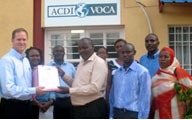
Boosting Incomes and Increasing Food Security
Rwanda covers an area of over 26,338 square km and is home to more than 8.1 million people, making it the most densely populated country in Africa. Although approximately 87 percent of Rwandans work in agriculture, per capita food production is low, and almost 60 percent of households live below the poverty line with very poor dietary diversity.
Following the civil war and genocide of the 1990s, Rwanda fell into a downward economic spiral compounded by market destabilization and severe food shortages due to systemic deficiencies in agricultural production, distribution, and marketing. In response to the severe situation, USAID awarded ACDI/VOCA three consecutive food assistance programs, including a $19 million Title II Development Activity Program, under which ACDI/VOCA worked to reduce chronic food insecurity and vulnerability of individuals, households, and communities throughout Rwanda. The program was implemented in 11 districts of Rwanda along with project partners Africare, the Clinton Hunter Development Initiative, the Rwandan Districts of Rulindo, Rwamagana, and Gicumbi, Development and Management Solutions (DMS), Wakala East Africa Ltd, and Construction Consultancy Corporation (CCC). ACDI/VOCA and its partners worked toward alleviating food insecurity through three strategic objectives:
- Increasing incomes and reducing vulnerability to food insecurity
- Improving household health and nutrition and reducing vulnerability to HIV/AIDS
- Increasing access to basic food commodities through monetization and local production
ACDI/VOCA worked to achieve these objectives through five major component areas: cooperative capacity-building training; food security enhancement activities and grants; agroforestry; road rehabilitation; Gikongoro Food Security Initiative (GFSI); and monetization and logistics.
Cooperative Capacity Building Training
Through the P.L. 480 Title II Program, ACDI/VOCA and its partners promoted cooperative development and improved food production. ACDI/VOCA provided training to 15 cooperatives on leadership and governance, cooperative management, and business skills. It also offered improved cooperative services to ten agricultural cooperatives on commercial farming. The services increased the value of agricultural production and increased farmers’ incomes. ACDI/VOCA worked alongside local training service providers, including DMS and Wakala East Africa Ltd, to deliver high-quality training and technical follow-up on agricultural production and business practices. These training services improved members’ knowledge of crop production methods, environmentally sound practices, post-harvest handling and storage techniques, and the better use of agricultural inputs.
Food Security Enhancement Activities and Grants
ACDI/VOCA allocated grant funding to 21 cooperatives and associations, benefiting over 2,500 member households in 6 districts. The $600,000 food security grants were used for training, technical assistance, production, post-harvest inputs, equipment, and capacity building. ACDI/VOCA provided the grants to organizations in food-insecure areas willing to pilot food crop activities that could eventually help members generate more income and therefore become less food insecure. Activities included the use of improved technologies and practices and the expanded use of agricultural inputs.
Agroforestry
ACDI/VOCA and World Agroforestry Centre joined efforts to implement a project called the “Shade Tree Agroforestry Project.” This was aimed at increasing incomes and food security for farmers by promoting the extensive adoption of tree shade in hillside farming for enhancing coffee quality, lessening soil erosion, and diversifying smallholder farming systems in the Rubavu and Rutsiro districts on Lake Kivu. The project worked with farm enterprises to identify shade tree varieties that improve coffee quality and production and are also complementary to coffee production. Shade trees provide a range of byproducts and services, such as food, livestock feed, soil fertility, and soil erosion control. Agroforestry also serves as a diversification of smallholder farming systems and is environmentally sustainable. Approximately 2,000 farmers planted and maintained agroforestry crops, and the shade tree project aimed to plant 1 million trees and strengthened coffee cooperatives to sustain these efforts.
Road Rehabilitation
ACDI/VOCA implemented a program of farm-to-market road rehabilitation to open up rural enclaves to commercial access. Improved roads provide farming households with better access to schools, health centers, and markets, thereby increasing agricultural productivity and marketing efforts and further contributing to health and nutrition efforts. ACDI/VOCA completed two road rehabilitation segments of a total of 15.7 km between the Murehe and Nzige sectors and the Nzige and Rubona sectors. An additional road segment was created to support the rehabilitation of a 10-km feeder road segment between the Mwuire and Rubona sectors. This particular road rehabilitation was estimated to benefit a total of 36,423 people living in the area.
Gikongoro Food Security Initiative (GFSI)
GFSI was a five-year subactivity implemented by Africare under ACDI/VOCA’s DAP. The goal was to reduce chronic food insecurity and vulnerability of individuals, households, and communities to food security shocks in the Nyamagabe district. Some of GFSI’s activities were behavior change communication, voluntary counseling and testing, home-based care, nutrition, and support to people living with HIV/AIDS (PLWHA); distribution of food commodities to associations of PLWHA; and mobile voluntary counseling and testing facility services. Approximately 3,760 beneficiaries were trained in HIV/AIDS awareness, and 691 metric tons of nutritious food was provided to PLWHA and their families.
Monetization and Logistics
ACDI/VOCA was the lead monetizer in the Rwanda Monetization Consortium, which also included Catholic Relief Services and World Vision. Major 2009 deliverables included the monetization of approximately 760 MT of commodity—including ACDI/VOCA’s portion—and approximately $35,000 in fees repatriated to HQ from 2009 umbrella monetization activities.





